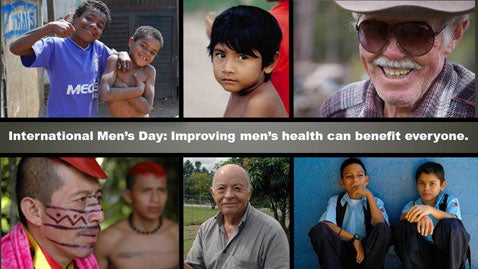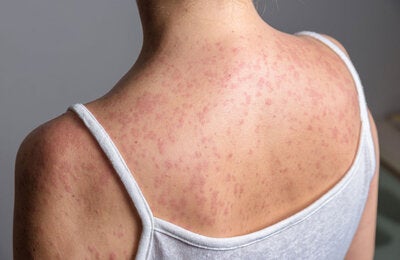

Echoing the theme of International Men's Day 2013—"Keeping Men and Boys Safe"—experts at the Pan American Health Organization/World Health Organization (PAHO/WHO) are urging action and policies to prevent avoidable illness and death among men and boys in the countries of the Americas.
Washington, D.C., 19 November 2013 (PAHO/WHO) — Echoing the theme of International Men's Day 2013—"Keeping Men and Boys Safe"—experts at the Pan American Health Organization/World Health Organization (PAHO/WHO) are urging action and policies to prevent avoidable illness and death among men and boys in the countries of the Americas.
"Men have special health needs and face special health risks," says Dr. Gina Tambini, director of PAHO/WHO's Department of Family, Gender and Life Course. "Protecting and promoting the health of men and boys requires understanding these needs and risks and developing policies and services that address them."
According to PAHO/WHO data, the leading causes of death for men in the Americas are heart disease and stroke, lung cancer, diabetes, and violence. The leading risk factors for both illness and death in men in the region include tobacco use, unhealthy diet, physical inactivity, harmful use of alcohol, workplace hazards, risk-seeking behaviors, and lack of access to and use of health services.
Reducing deaths and illness among men requires individual behavior change but also appropriate and effective public policies and health services.
"Men need to adopt healthy life habits and to break down barriers and access the health services they need," says Tambini. "But in addition, countries need national policies aimed at reducing risk factors such as tobacco and alcohol consumption, and they need health services that are accessible and acceptable to men and attuned to their special needs."
Protecting and promoting men's health is critical for their own welfare but also because men's health problems have spillover effects on their families and their communities. For example, alcohol is the top risk factor for death or illness in men between 15 and 49 years of age. It's also a trigger for violence by men against women as well as child abuse and neglect. So addressing harmful use of alcohol by men can potentially have positive effects on others around them.
"And as we strive to achieve universal health coverage," says Tambini, "we need to reach out to boys and men with health services that address their specific needs at different points in their life course."
PAHO, founded in 1902, is the oldest international public health organization in the world. It works with its member countries to improve the health and the quality of life of the people of the Americas. It also serves as the Regional Office for the Americas of WHO.
Links:
- PAHO Gender and Health program
- International Men's Day website
- http://www.paho.org
- https://www.facebook.com/PAHOWHO
- https://www.youtube.com/pahopin
- https://twitter.com/pahowho#InternationalMenDay
Media Contacts:
Leticia Linn, linnl@paho.org, Tel. + 202 974
3440, Mobile +1 202 701 4005, Donna Eberwine-Villagran, eberwind@paho.org, Tel. +1 202 974 3122,
Mobile +1 202 316 5469, Sebastián Oliel, oliels@paho.org, Phone +1 202 974 3459, Mobile 202 316
5679, Knowledge Management and Communications,
PAHO/WHO—www.paho.org



